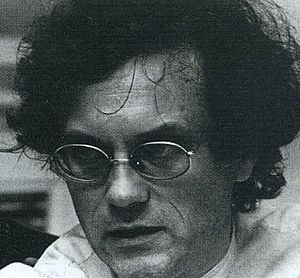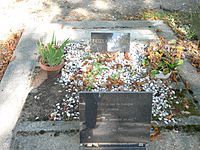Félix Guattari facts for kids
Quick facts for kids
Félix Guattari
|
|
|---|---|

Félix Guattari
|
|
| Born |
Pierre-Félix Guattari
30 March 1930 Villeneuve-les-Sablons, Oise, France
|
| Died | 29 August 1992 (aged 62) La Borde clinic, Cour-Cheverny, France
|
| Alma mater | University of Paris |
| Era | 20th-century philosophy |
| Region | Western philosophy |
| School | Continental philosophy, post-Marxism, Freudo-Marxism, psychoanalysis, post-structuralism |
| Institutions | University of Paris VIII |
|
Main interests
|
Psychoanalysis, Marxist philosophy, political philosophy, philosophy of language, semiotics |
|
Notable ideas
|
Assemblage, desiring-production, deterritorialization, ecosophy, schizoanalysis |
|
Influenced
|
|
Pierre-Félix Guattari (born April 30, 1930 – died August 29, 1992) was a French thinker and writer. He was interested in how people's minds work (a psychoanalyst) and how societies are organized (a political philosopher). He also studied signs and symbols (semiotician) and was a social activist.
Guattari is well-known for working with another famous philosopher, Gilles Deleuze. Together, they wrote important books like Anti-Oedipus and A Thousand Plateaus. These books explored new ways of thinking about society, psychology, and how we understand the world. He also helped create ideas like schizoanalysis and ecosophy, which connect mental health with the environment.
Contents
Félix Guattari's Life and Work
Early Life and La Borde Clinic
Félix Guattari was born in Villeneuve-les-Sablons, a town near Paris, France. His father was a factory manager. As a teenager, Guattari was involved in Trotskyist political groups, which are about social change.
In the 1950s, he studied with a famous French psychoanalyst named Jacques Lacan. After his studies, Guattari spent his whole life working at an experimental mental health clinic called La Borde. This clinic was special because it tried new ways of helping people with mental health challenges.
New Ideas at La Borde
At La Borde, they didn't just have one therapist working with one patient. Instead, they tried group therapy, where many people talked together. This helped them understand how people interact in complex ways. This experience made Guattari think more deeply about many other subjects, like philosophy, linguistics (the study of language), and architecture.
Activism and Collaborations
From the mid-1950s to the mid-1960s, Guattari worked on a Trotskyist newspaper called La Voie Communiste. He supported movements that fought against colonialism and worked with Italian activist groups.
He also helped create groups that brought together psychiatrists and other thinkers. These groups explored ideas in philosophy, psychoanalysis, education, and more. Guattari was involved in many political and cultural activities, like supporting anti-war movements and working with student groups.
May 1968 and Deleuze
In 1968, Guattari was part of the big student and worker protests in France. After these protests, he met Gilles Deleuze at the University of Vincennes. This meeting was very important because they started working together on their famous book, Anti-Oedipus. Another philosopher, Michel Foucault, called this book "an introduction to the non-fascist life," meaning it helped people think freely and resist harmful ideas.
In the 1970s, Guattari continued to explore new ideas. He was once fined for publishing a controversial issue of a journal he edited. Later, in the 1980s, he became interested in the environmental movement and developed his idea of "ecosophy", which connects mental health with the environment.
Later Years and Key Ideas

In his last book, Chaosmosis (1992), Guattari thought about how we create our own sense of self and how we can keep making it richer and more open to new ideas. This was a big theme throughout all his work.
He also wrote What is Philosophy? with Deleuze. In Chaosmosis, Guattari suggested that our sense of self is made up of many different parts, including our thoughts, feelings, and how we connect with the world around us.
Legacy and Influence
Félix Guattari passed away on August 29, 1992, at the La Borde clinic.
After his death, some of his essays and interviews were published in books like Chaosophy and Soft Subversions. These collections show his work at the La Borde clinic and his ideas with Deleuze. They introduce his concept of "schizoanalysis", which is a more experimental and group-focused way of understanding the mind, building on Sigmund Freud's psychoanalysis.
Guattari's ideas, like "micropolitics" and "ecosophy," aimed to help people think more freely and resist the ways that global capitalism tries to make everyone the same. He believed in finding new ways for people to express themselves and create positive change in the world.
Major Works in English
- Deleuze, Gilles and Félix Guattari. 1972. Anti-Oedipus. This book explores new ideas about psychology and society.
- 1975. Kafka: Toward a Minor Literature. This book looks at the writings of Franz Kafka in a new way.
- 1980. A Thousand Plateaus. This is the second part of their major work, Capitalism and Schizophrenia.
- 1991. What Is Philosophy?. This book explores the meaning and purpose of philosophy.
- 1977. Molecular Revolution: Psychiatry and Politics. This book discusses how mental health and politics are connected.
- 1989. The Three Ecologies. This book talks about the links between mental, social, and environmental health.
- 1992. Chaosmosis: An Ethico-Aesthetic Paradigm. Guattari's last book, exploring how we create our sense of self.
- 1995. Chaosophy (Texts and Interviews 1972 to 1977). A collection of his essays and interviews.
- 1996. Soft Subversions (Texts and Interviews 1977 to 1985). More essays and interviews from his later years.
See also
 In Spanish: Félix Guattari para niños
In Spanish: Félix Guattari para niños
- Anti-psychiatry
- Deleuze and Guattari
- History of capitalism
 | Frances Mary Albrier |
 | Whitney Young |
 | Muhammad Ali |

